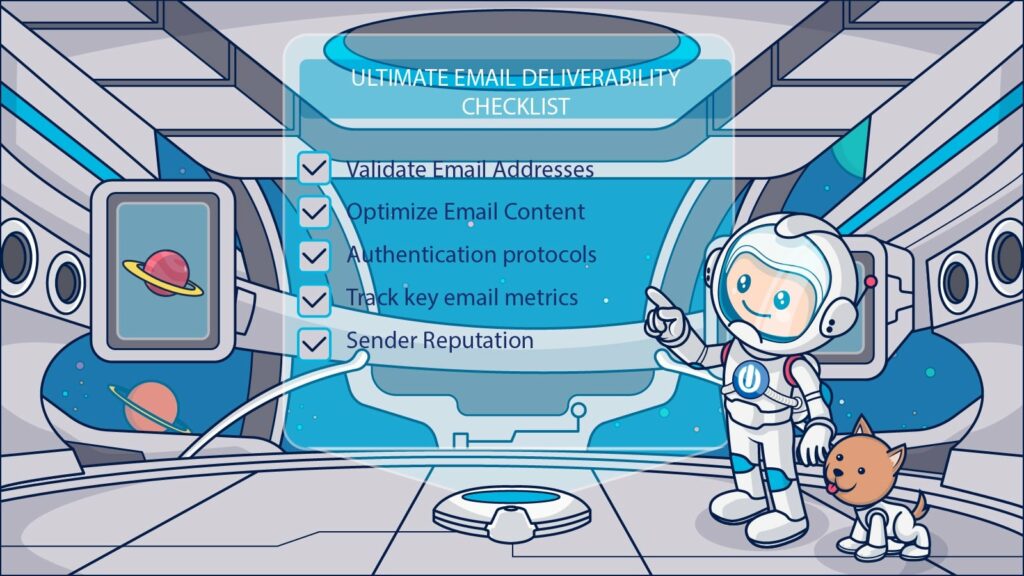When engaging in email marketing, your IP address is an important factor to consider, as it plays a significant role in whether or not outgoing emails actually end in recipients’ inboxes as intended (aka email deliverability).
There are a variety of options available in regard to IP addresses, each with its own pros and cons. Using a shared IP is one popular choice.
What is an IP address?
To explain what a shared IP is, it’s important to establish what an IP address is.
An IP (Internet Protocol) address is a unique sequence of numbers that identifies a specific device on a network. IP addresses allow devices to communicate with and transmit data to other devices using the network they are connected to.
There are two forms of IP addresses: IP version 4 (IPv4) and IP version 6 (IPv6) addresses.
IPv4 addresses are the most common form and are represented by four numbers between 0 and 255, each separated by a period.
IPv6 addresses are made up of eight groups of four hexadecimal digits separated by colons, creating a greater bank of available IP addresses to assign to devices.
What is a shared IP?
A shared IP address is used simultaneously by multiple users, with all data being sent via the same server. This means that a large pool of email senders can send outbound mail separately from their own devices, yet all messages will appear to have come from the same IP address.
The opposite of a shared IP address is a dedicated IP address. A dedicated IP address is assigned exclusively to a single sender address. This is usually provided by an email service provider (ESP) that handles outgoing mail.
What are the pros and cons of a shared IP?
As an email marketer, there are positives and negatives to choosing between a shared IP or dedicated IP.
Pros of a shared IP address
Affordability
Using a shared IP is more cost-effective than using a dedicated IP. Because a large number of senders use a shared IP through the same service, server costs are divided between users, making shared IPs very affordable.
Ease of use
Shared IP addresses are quite simple to set up when compared to dedicated IPs. Typically, this can be done easily through an email tool with just a couple of clicks.
In addition, using a shared IP address can be beneficial because it doesn’t require users to engage in IP warming to establish themselves with internet service providers (ISPs).
Reputation pooling
When sending emails for marketing purposes, it can take time to build up an IP reputation that allows your messages to arrive at their intended destinations.
However, by using a shared IP, senders’ IP reputations are pooled, which can often improve deliverability for everyone.
This means that it is quite easy to build up a good sender reputation, even when sending out a relatively low volume of emails, by essentially “borrowing” reputational credibility through your ESP. In this sense, shared IPs are a good option for new senders.
Cons of a shared IP address
Potential reputational damage
Though shared IP addresses can benefit new senders who don’t have much of a reputation, they can equally disadvantage those who do.
Since all users of a shared IP are connected, the negative practices of other senders can potentially harm the deliverability of your emails, and ultimately your campaign.
Even though email service providers typically take careful measures to track and discourage negative sending habits, there is still a small degree of risk that users need to be aware of.
Limited brand identity
When sending from a shared IP pool, your brand is blended with all others using the same mail server. This means that regardless of the quality and effectiveness of your email marketing content, it can be challenging to establish a strong brand identity at the domain level.
When is the right time to use a shared IP?
Shared IP addresses remain a popular choice for many users the world over, but they aren’t the optimal choice for everyone.
Depending on the specific nature of your operations, there are different reasons to opt for a shared IP rather than a dedicated one.
Typically, shared IP addresses are at their most beneficial when your business meets one of the following criteria:
You are a low-volume sender
If your email marketing campaign involves sending out a relatively low volume of messages, you will encounter difficulty building up your reputation and deliverability effectively without a shared IP.
Your schedule doesn’t allow for IP warming
IP warming involves gradually sending increasing amounts of mail to familiarize an ISP with your sending behavior. This can take as long as 8 weeks in some cases, so if you can’t spare the time, you may be best served using a shared IP.
For the reasons outlined above, shared IPs are typically the choice for smaller businesses that are aiming to reach smaller, more niche audiences with their email marketing content.
Conclusion
For larger businesses and users who want more control over their IP reputation and brand identity, dedicated IP addresses are often a good way to go. However, dedicated IPs are much less forgiving in regard to user mistakes, making shared IPs more accessible.
There remains a lot to be said for shared IP addresses in the case of small businesses and new senders, too.
Shared IPs provide senders with a convenient way to build IP reputation to increase their deliverability, and this can be done when a business is in its infancy and performing infrequent send-outs. Moreover, shared IPs are considerably more cost-effective than dedicated ones, which makes them an attractive option for those on a budget.
Choosing what kind of IP address to use for your email marketing is a big decision. All in all, it is up to you to weigh the benefits and drawbacks of each option and decide which is best suited to meet the marketing needs of your business.













